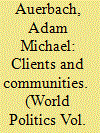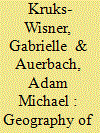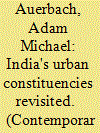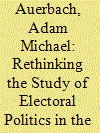|
|
|
Sort Order |
|
|
|
Items / Page
|
|
|
|
|
|
|
| Srl | Item |
| 1 |
ID:
146462


|
|
|
|
|
| Contents |
India’s urban slums exhibit dramatic variation in their levels of infrastructural development and access to public services. Why are some vulnerable communities able to demand and secure development from the state while others fail to? Based on ethnographic fieldwork and original household survey data, the author finds that party networks significantly influence the ability of poor urban communities to organize and demand development. In slums with dense party networks, competition among party workers generates a degree of accountability in local patron-client hierarchies that encourages development. Dense party networks also strengthen organizational capacity and provide settlements with vertical connectivity to politicians and officials. The presence of multiparty networks, however, may attenuate the positive influence of party network density. Interviews with political elites and the survey data suggest that politicians are less likely to provide services to slums with multiparty networks. From within settlements, partisan competition also creates perverse incentives for rival networks to undermine each other’s development efforts. This article contributes to scholarship on clientelism, which has overlooked variation in the density and partisan balance of patron-client networks across poor urban communities and the resulting divergences in democratic responsiveness and development that face those communities. It also contributes to research on distributive politics and the political economy of development.
|
|
|
|
|
|
|
|
|
|
|
|
|
|
|
|
| 2 |
ID:
175835


|
|
|
|
|
| Summary/Abstract |
When and why do poor citizens expect the state to respond to their claims, and how do those expectations shape citizenship practice? Drawing on survey and qualitative research in northern India, our study reveals an expectations gap that complicates widely held views of the urban core versus the rural periphery. The urban poor residing in slums are dramatically less likely to believe that they will get a direct response from an official compared to similarly poor rural residents. Slum residents are also significantly more likely than villagers to report the presence of political brokers, who create mediated channels for claim-making. Reflecting on these patterns, we develop a place-based theory to explain sub-national variation in citizen-state engagement. We focus in the northern Indian context on three interrelated factors that shape the local terrain for citizenship practice: the greater visibility of social welfare provision in villages compared to slums; the greater depth of rural decentralization; and the greater strength of urban party organizations. Extending beyond northern India, we propose an analytical framework for the study of citizenship that examines how citizens’ local experiences of state institutions influence sub-national patterns of participation.
|
|
|
|
|
|
|
|
|
|
|
|
|
|
|
|
| 3 |
ID:
162209


|
|
|
|
|
| Summary/Abstract |
Conventional models of clientelism often assume poor voters have little or no choice over which local broker to turn to for help. Yet communities in many clientelistic settings are marked by multiple brokers who compete for a following. Such competition makes client choices, and the preferences guiding such choices, pivotal in fueling broker support. We examine client preferences for a pervasive broker—slum leaders—in the context of urban India. To identify resident preferences for slum leaders, we conducted an ethnographically informed conjoint survey experiment with 2,199 residents across 110 slums in two Indian cities. Contra standard emphases on shared ethnicity, we find residents place heaviest weight on a broker's capability to make claims on the state. A survey of 629 slum leaders finds client-preferred traits distinguish brokers from residents. In highlighting processes of broker selection, and the client preferences that undergird them, we underscore the centrality of clients in shaping local brokerage environments.
|
|
|
|
|
|
|
|
|
|
|
|
|
|
|
|
| 4 |
ID:
139626


|
|
|
|
|
| Summary/Abstract |
This article examines patterns of voter turnout and electoral competition in India's urban parliamentary constituencies. It places the 2014 Lok Sabha elections in historical context, drawing on constituency-level data from national elections since 1977 to explore broad changes and continuities in electoral competition, party structures, and voter turnout, with particular focus on comparisons between urban and rural India. The purpose of the article is descriptive, seeking to fill a gap in the literature on electoral competition in urban India. I find evidence that India's urban constituencies have recently, on average, been less competitive and participatory than non-urban constituencies, though this has not been a consistent trend since the mid-1970s. This article concludes with a brief outline for a research agenda on electoral politics in urban India.
|
|
|
|
|
|
|
|
|
|
|
|
|
|
|
|
| 5 |
ID:
184265


|
|
|
|
|
| Summary/Abstract |
In the study of electoral politics and political behavior in the developing world, India is often considered to be an exemplar of the centrality of contingency in distributive politics, the role of ethnicity in shaping political behavior, and the organizational weakness of political parties. Whereas these axioms have some empirical basis, the massive changes in political practices, the vast variation in political patterns, and the burgeoning literature on subnational dynamics in India mean that such generalizations are not tenable. In this article, we consider research on India that compels us to rethink the contention that India neatly fits the prevailing wisdom in the comparative politics literature. Our objective is to elucidate how the many nuanced insights about Indian politics can improve our understanding of electoral behavior both across and within other countries, allowing us to question core assumptions in theories of comparative politics.
|
|
|
|
|
|
|
|
|
|
|
|
|
|
|
|
|
|
|
|
|